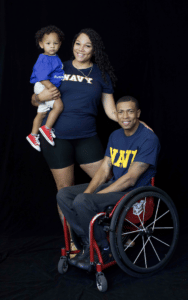National Architecture Day
Posted By PVA Admin on October 7, 2019
For able-bodied people, building design tends to be an aesthetic preference. You like the way a kitchen opens up into a living room, or you consider where a hallway, a door, or a driveway will be located.
To members of the disability community, however, the way a building is designed means they either will, or will not, be able to function comfortably within it, if they can access it at all.
If you found yourself in a wheelchair tomorrow, would you be able to reach a light switch? Appliances on your countertop? The soap dispenser, paper towels or sink in a public restroom? Could you find accessible seats at a sporting event, or the theater? Would you be able to access an outlet so you could charge your phone? Would a doorway be wide enough for you to fit your wheelchair through safely? Would you have to enter the building using an alternate entrance because of stairs inside or outside the building prohibit access?
Paralyzed Veterans of America believes there should be no limits on your ability to enjoy your life. PVA is the only veterans’ service organization that employs full-time architects to make sure that veterans and all Americans with disabilities are able to access any place in their communities in a safe and dignified manner. We are also strong advocates for accessible design in architecture and construction industries, helping to develop building codes and standards for the entire nation – because access to public buildings and structures should be a fundamental right.
Some of our notable achievements include advising on the accessibility of:
- Washington National’s Ballpark
- Virginia Governor’s Executive Mansion
- Dwight D. Eisenhower Memorial
- Minnesota Vikings (U.S. Bank) Stadium
- REACH, a unique expansion of the John F. Kennedy Center for the Performing Arts

“The Americans with Disabilities Act (ADA) doesn’t necessarily provide equality,” said Mark Lichter, Director of Architecture for PVA. “It really only outlines minimal standards for accessibility. That’s where we come in by being advocates for people with disabilities.”
Today on National Architecture Day we celebrate our PVA architects and their work to ensure that our veterans with spinal cord injuries or diseases, and all Americans with disabilities, can live their lives with freedom, dignity, and equality.

